by Charlotte Firbank-King
editor, writer, illustrator
The most important sentence you’ll ever write is the first line of your book or novel. There’s nothing easy about writing that first line—but many times, that line will decide if the reader will continue reading or not. Here’s what that first line must do:
Hook the reader
Here is an example of an opening line—the hook:
The captain stood on the deck of his ship in torpid heat, slowly whipping his wife.
This was an example given to me years ago by a publisher, and I use it all the time. A number of things cause the reader to want to read on—things that hook them.
1) What era is it?
2) Torpid heat? Where is it happening?
3) Why is the captain whipping his wife? More curiously, why is he whipping her slowly?
The reader wants these things answered. They are almost compelled to read on. Hook your reader in one or two sentences.
Hit the ground running
The first line is the most important part, next the paragraph, then the first page, but having said that, if the first five pages aren’t fantastic you will lose the reader. Most certainly, you will lose the publisher or agent. They’re very busy and can tell in the first paragraph if they want you or not. Then they are more convinced if the first page is great. However, that interest wanes rapidly if the second page doesn’t deliver, but they will probably forge on for another page. After that, if you don’t continue to deliver, it’s all downhill and your manuscript ends up on the slush pile.
The opening paragraph doesn’t have to be a mother throwing her ten children into shark infested water—tempting as the thought might be when your brood is that big—but it does have to grab the reader’s attention and hold it.
Smaller hooks at the ends of chapters.
You want your reader to keep turning pages, so end each chapter with a hook that will drag them to the next one. After a gut-wrenching chapter the protagonist finally makes it to safety. You slow the pace, bring the reader down until they are ready to fall asleep and read another day. But then you drag them right back into the action. They must read on.
Emma sagged to the floor in lifeless air, safe at last. Then a door snicked open and icy fingers caressed her neck. End of chapter. A bit dramatic, but you get the picture. You could drag it out and switch to another character in the next chapter, but you might piss your reader off, so choose your moments with care.
Four examples of opening lines:
The man in black fled across the desert, and the gunslinger followed. (Stephen King, The Gunslinger.)
It was the best of times, it was the worst of time, it was the age of wisdom, it was the age of foolishness, it was the epoch of belief, it was the epoch of incredulity, it was the season of Light, it was the season of Darkness, it was the spring of hope, it was the winter of despair. (Charles Dickens, A Tale of Two Cities.)
They shot the white girl first. (Toni Morrison, Paradise.)
Lolita, the light of my life, fire of my loins. My sin, my soul. (Vladimir Nabokov, Lolita.)
Examples of first paragraphs/lines from our editors
Our team of editors is immensely versatile and talented. The nature of their job requires them to work in different genres, which they do with amazing ease and skill. Although our editors can work in multiple genres, they can’t work in every genre, which is why IFW needs editors versed in various genres. On a personal level, they each write in their preferred genre.
Sandy Tritt, short story, “Cousin Mary”:
What is the truth? And is the truth always more honest than fabrication? More noble? I don’t know. It makes my head hurt. But here I sit at the Crystal Cafe, waiting for my sisters. Stuffed inside my purse is the truth. The real truth. And I have just a few minutes to decide if I will reveal it.
Jimmy Carl Harris, “I Come to the Garden Alone,” the first story in his short story collection, Wounds that Bind:
I buried you next to him.
Jessica Murphy, “Nature’s Conscience”:
I awoke with a sharp pain in my back, sprawled across what felt like cables.
Sandi Rog, Yahshua’s Bridge:
Alexander held his breath as the man he’d never called Daddy forced him underwater.
Patsy Evans Pittman, Blood Kin & Other Strangers:
Deena stood in the kitchen of the house where she grew up, giving the creamed tomatoes one last stir. It was hot as blazes and the window air-conditioner in the dining room didn’t help much. She blew the fringe of bangs out of her eyes, then swiped at the sweat on her upper lip with the sleeve of her over-sized WVU tee shirt.
Sherry Wilson, Second Beginning:
The cameras flashed as Danielle stepped out of the limo, her sights on the entrance of the Royal Albert Hall. The paparazzi swarmed around her like killer bees and she longed for a cloak of invisibility, if only for the short trip to the doors.
She has a great body, my friend does, I’ll give her that. And I have no problem telling you she’s at least ten years younger than I am, and looks it.
C.F. King, All Things Carnal:
Thomas Gantry wore tolerance like a hair shirt, with grim determination. Daily, he did penance for Man’s sins. Self-flagellation was his redemption, and joy his nemesis.
As you can see, it’s important to start your story with a line that makes people want to read on. If you’re having trouble with this, let us know. We can help.
© 2013. Charlotte Firbank King. All Rights Reserved.




















